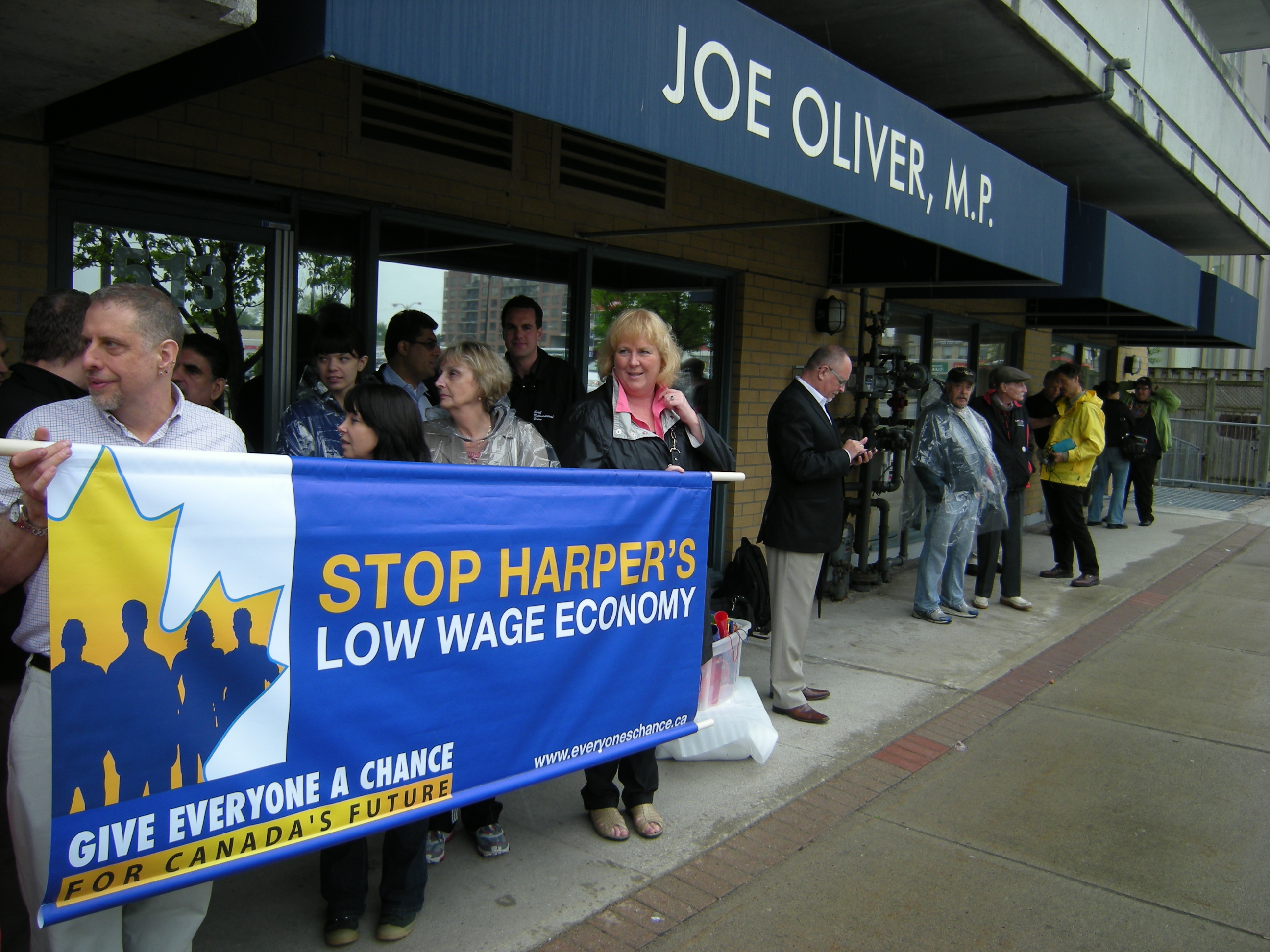Please support our coverage of democratic movements and become a supporting member of rabble.ca.
On a rainy Monday morning outside Federal Natural Resources Minister Joe Oliver’s constituency office in Toronto, the United Steelworkers and their allies held a rally to protest the Conservative government’s low-wage, anti-worker agenda and corporate abuses of the Temporary Foreign Worker Program.
“We’re very concerned about the Temporary Foreign Worker Program and what it’s doing to workers they’re brining in from around the world,” said Carolyn Egan, president USW Local 8300.
“Exploiting at lower wages, bad conditions, trying to take advantage of their need for work.”
Part of a strategy, said Egan, put forward by the Conservatives to create a low-wage Canada.
“They’re using thousands of temporary foreign workers to bring down wages in this country and create terrible conditions for all of us,” said Egan.
Monday’s demonstration was part of a national campaign, Give Everyone A Chance for Canada’s Future, launched by the USW.
The campaign aims to raise awareness and mobilize the public around the abuses of the Temporary Foreign Worker Program and its role in the Harper government’s low-wage economic model for Canada, the need for better job training programs and more public debate on the future of resource development in this country.
“Workers are being brought in (to Canada) and being held hostage to many employers,” said Ken Neumann, national director USW.
“And that’s not the kind of Canada that we want.”
The USW insists if temporary foreign workers are needed in Canada, they receive the same rights and freedoms as Canadian citizens.
In addition to educating the public about the dangerous, low-wage model of economic development promoted by the Harper government, Give Everyone A Chance For Canada’s Future wants to pressure the Conservatives to establish effective job training programs to deal with “the unacceptably high levels of youth unemployment, unemployment in Aboriginal communities and unemployment among the general public.”
The Temporary Foreign Worker Program (TFWP) enables employers to hire foreign workers on a temporary basis to fill immediate skills and labour shortages, when Canadian citizens and permanent residents are not available to do the job.
At least, that’s how the TFWP is supposed to work.
In April, the Conservatives bowed to pressure from public, labour organizations, migrant worker groups and others to change provisions of the TFWP.
Those changes included eliminating an employer’s ability to pay temporary workers up to 15 per cent less than the prevailing wage, temporarily suspending the Accelerated Labour Market Opinion process, strengthening government oversight over the program, increasing fees for employers and identifying English and French as the only languages that can be used as a job requirement.
But the Give Everyone A Chance For Canada’s Future campaign said the changes were inadequate.
The government didn’t mention additional staffing to provide the oversight, any limits on the number of temporary workers that are admitted to Canada each year and how Canadians can be guaranteed better access to jobs before employers can bring in temporary workers.
Or outline a clear path to citizenship for lower-skilled temporary workers and their families or how corporations and employers will be held accountable for abusing the TFWP.
The Ontario Federation of Labour (OFL) is developing a migrant workers’ bill of rights.
“If you’re going to bring in temporary foreign workers, we’ve got to make certain that they have the same protection as every other worker in this country,” said Sid Ryan, president OFL.
“Access to EI, health and safety regulations and WSIB. Proper living and working conditions.”
Nigel Barriffe, a school teacher in Rexdale and a member of the Good Jobs for All Coalition, has seen the negative impact that the Conservative government’s legislation – not just the TFWP – has had on his community in Etobicoke North.
“We have parents who come here to Canada unable to get good jobs because their qualifications aren’t being recognized,” said Barriffe.
“They’re underemployed, having to depend on food banks and other programs just to survive. And we know the effect that has on our children.”
Yet the Conservative government continues to push the expansion of the TFWP.
“The big dirty oil companies can’t wait to dig out more of that dirty oil, pollute the planet and make money for themselves,” said John Cartwright, president Toronto & York Region Labour Council.
“So they can flood the tar sands with thousands of skilled workers and exploit the resources that are so dangerous to our planet’s future.”
That’s spilled over to other sectors of the economy, where workers are paid minimum wage or less and often forced to pay outrageous recruitment fees to work in Canada.
“And that’s robbery,” said Cartwright.
So are the changes to EI which have rendered thousands of permanent workers ineligible to benefits even though they made contributions.
Others are cut off benefits if they don’t take a job earning up to 30 per cent less then their past earnings or won’t drive up to 100 kilometres to accept a new job.
“We don’t want people to misinterpret our opposition to the TFWP as being anti-immigrant,” said Cartwright.
“Immigrants are so welcome. But as full citizens with full rights to join our movement and build a better Canada.”
When Abdi Dirshe, now the Director of Organizing for iTaxiworkers Association, came to Canada, he was in the same situation as many precariously employed recent immigrants.
“Many of the workers that we represent are new immigrants,” said Dirshe. “And they have been exploited. They have no protection.”
Often isolated, stuck in difficult situations where they’re vulnerable to continuous exploitation.
“Anyone who has a right to work here, has a right to live here, has a right to be paid a decent wage,” said Carolyn Egan.
“And has a right to the path of citizenship. That is what we are fighting for.”
Labour, temporary foreign workers and the community fighting together.
“For a decent quality of life for everyone,” said Egan.




